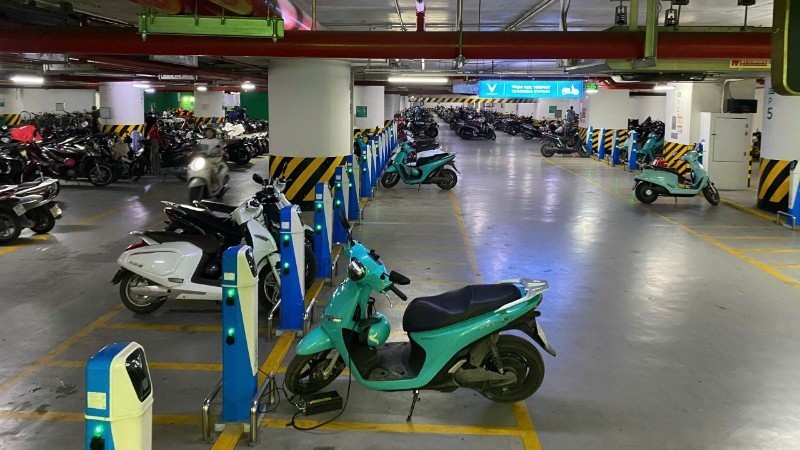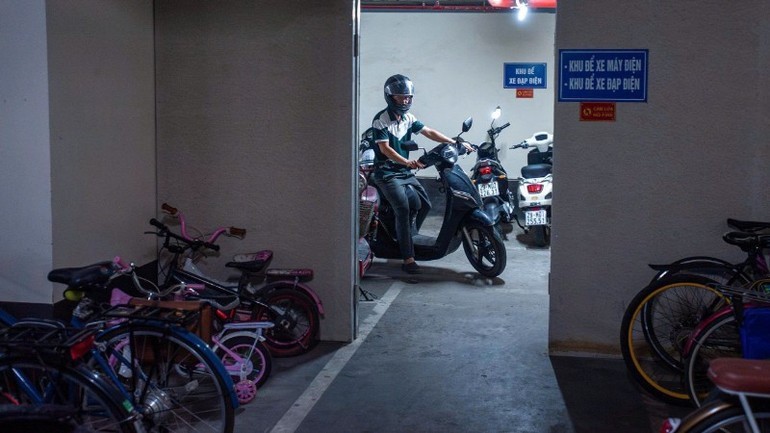Ha Noi is expediting its plan to ban all fossil fuel-powered motorcycles and mopeds from operating within the ring road 1 area, starting July 1, 2026. This policy is expected to improve urban environmental quality and accelerate the city’s green transition.

Dedicated electric motorcycle and car charging station at the Lieu Giai Tower apartment complex in Ha Noi.
Ha Noi upgrades infrastructure
In line with the Prime Minister’s Directive No. 20/CT-TTg dated July 12, 2025 on urgent measures to prevent and tackle environmental pollution, Ha Noi is fast-tracking the ban on fossil fuel motorcycles within the capital. The roadmap is as follows: from July 1, 2026 within ring road 1, from January 1, 2028 within ring road 2, and from 2030 within ring road 3.
Once implemented, the policy will significantly impact the volume of vehicles travelling into and out of the city, particularly from areas outside ring road 1, suburban districts, and neighbouring provinces. Many citizens have suggested the need for transfer stations and reasonably priced parking facilities to allow convenient switching of vehicles when entering or exiting the ring road 1 zone.
Infrastructure for electric vehicles must be sufficiently developed, with charging stations accessible in every residential area within ring road 1, and public transport services expanded.
Associate Professor Dr Nguyen The Luong from the Centre for Power Sources and Autonomous Vehicles at Ha Noi University of Science and Technology stated that the ban on petrol-powered motorcycles and encouragement of electric alternatives presents numerous challenges. These include fire and explosion safety, the charging network, battery quality management and disposal, ensuring power supply for charging, and the adoption of motorcycle emission standards that have been under review.
The Ha Noi Department of Construction is undertaking multiple tasks to support green vehicle transition. This includes forming a task force to study and advise the municipal People’s Committee on the most effective strategies and locations for implementation. Integrated solutions are prioritised, such as converting vehicle types, upgrading transport infrastructure and public transport services, investing in charging stations, and promoting the use of eco-friendly vehicles.
At a working session between Ha Noi’s municipal leaders and representatives of relevant departments, agencies, and enterprises regarding the progress of the city’s green transportation initiatives, Vice Chairman of the municipal People’s Committee Nguyen Manh Quyen instructed the Department of Construction to lead a review of existing regulations and standards, and to propose a comprehensive master plan for the citywide green transition.
Furthermore, the department is also exploring adjustments to bus routes to better serve public travel needs, ensuring a fully integrated public transport system across the capital.
To achieve this objective, the city requires a detailed roadmap. Infrastructure development must take the lead, especially the early rollout of charging stations, along with land use planning for implementation.
A need for holistic solutions
Experts emphasise that green transition is not merely a technical issue, but a transformational movement requiring changes in habits, perceptions, and societal behaviour. Therefore, it demands an integrated approach involving policy roadmaps, socio-economic support, and awareness-building through communication.

Area for electric motorcycles and bicycles in the basement of an apartment building in Ha Noi
Associate Professor Dr Tran Thanh Nam, Vice Rector of the University of Education under Viet Nam National University, Ha Noi, noted that the country currently has about 2.5 million electric motorcycles in circulation and approximately 25,000 registered electric cars. Such a policy could present psychological barriers for different social groups.
For example, students are generally adaptable and willing to change, yet they depend financially on their families. If the infrastructure for affordable and convenient charging is not ready, it could raise their living costs and limit their opportunities for part-time work.
Older, low-skilled workers who rely on petrol motorcycles as their primary means of transport may hesitate to transition due to fears of losing their livelihoods. The time needed to shift from petrol usage habits will depend greatly on the supporting infrastructure and targeted support policies.
Sharing his insights, Associate Professor Dr Nguyen Duc Loc, Director of the Institute for Social Life Studies, stated that to implement such a significant policy shift or kick off a major societal change, policymakers must ensure the availability of sufficient resources. This is not merely about budgetary allocation but also about a genuine commitment to operational feasibility.
For instance, a financial support fund should be established to help low-income individuals switch vehicles, including preferential loan programmes or even direct subsidies during the transitional phase. The technical infrastructure, ranging from electric charging stations and maintenance networks to a robust public transport system, must be capable of meeting the needs of all users.